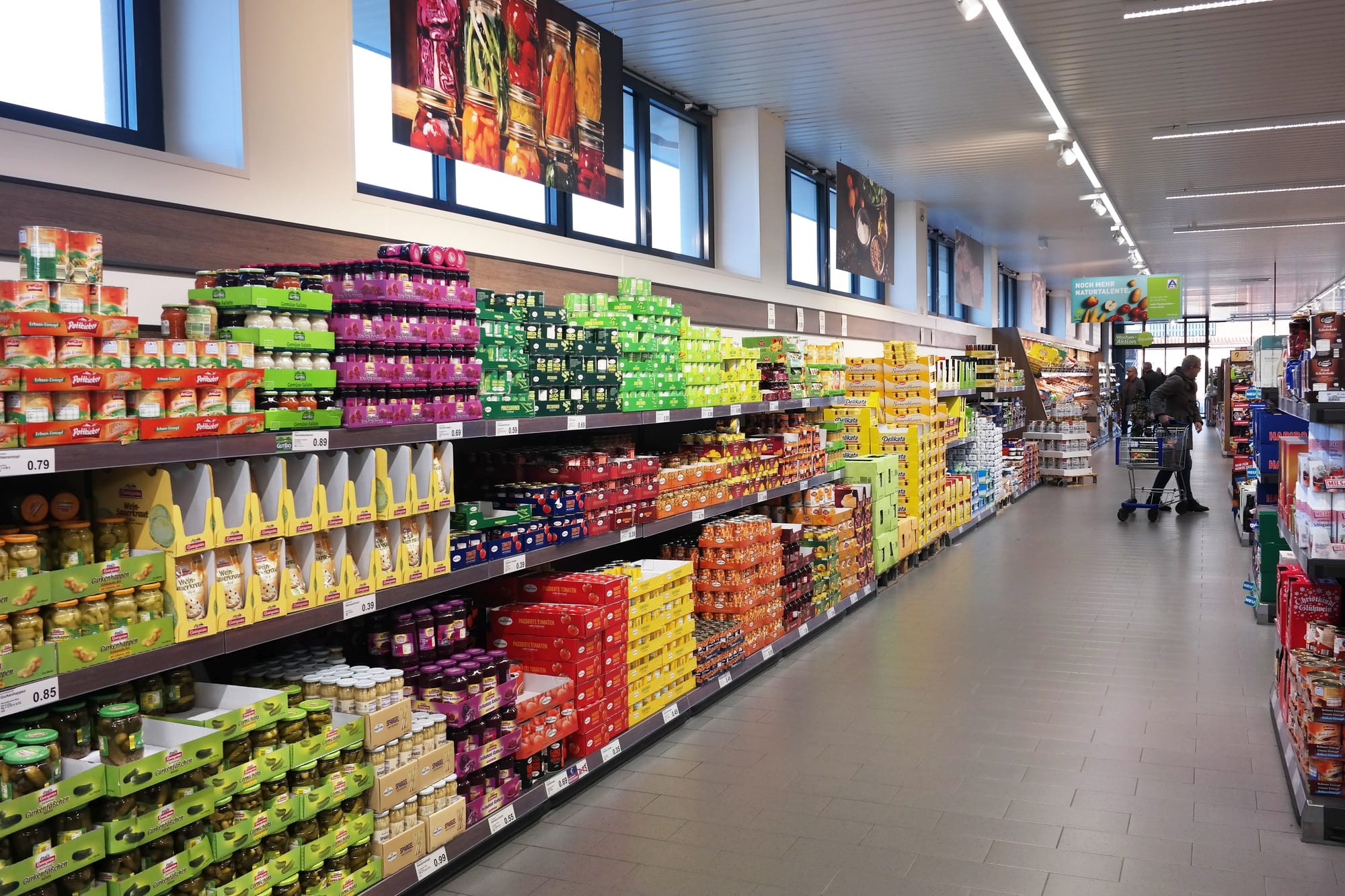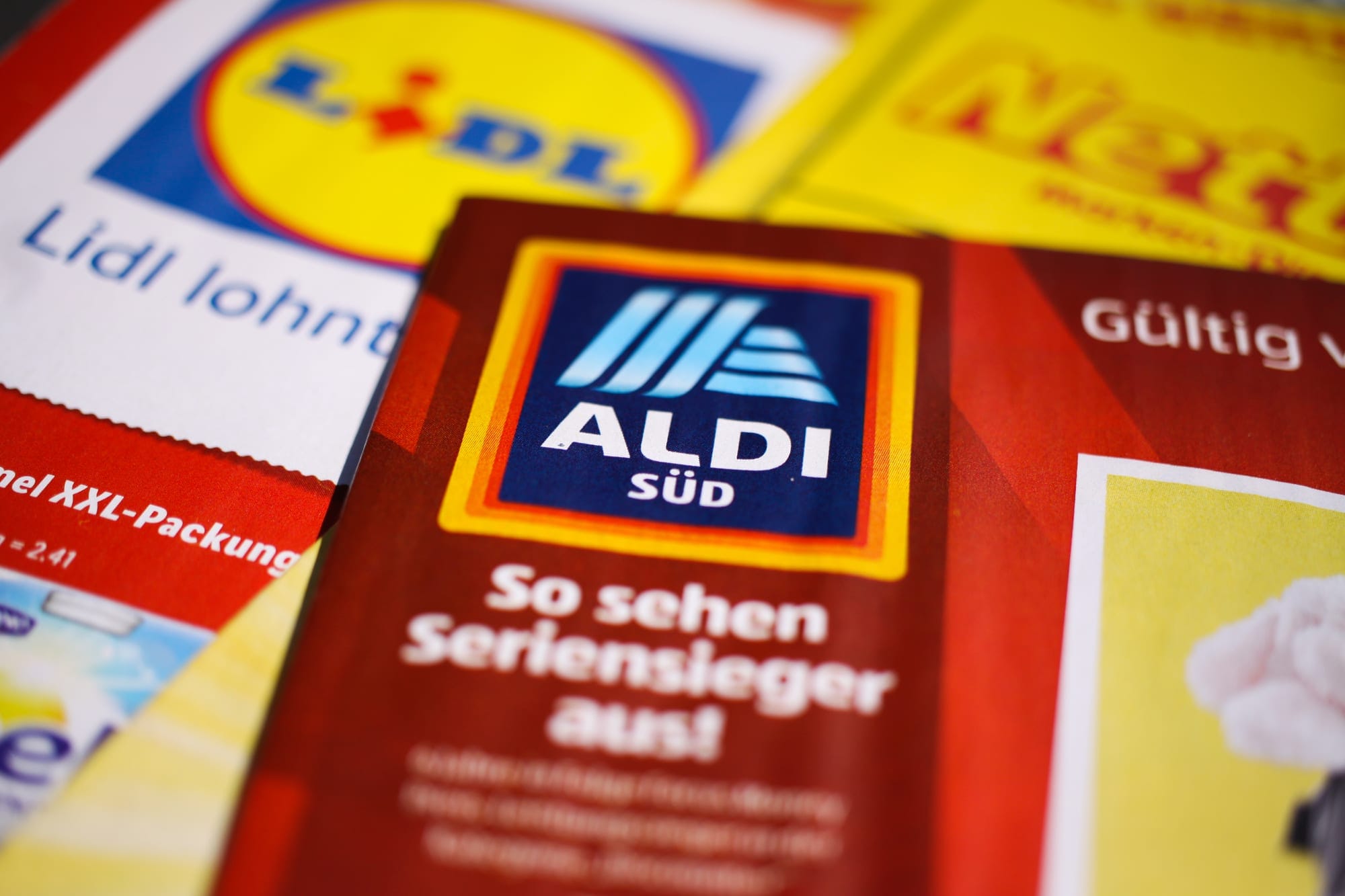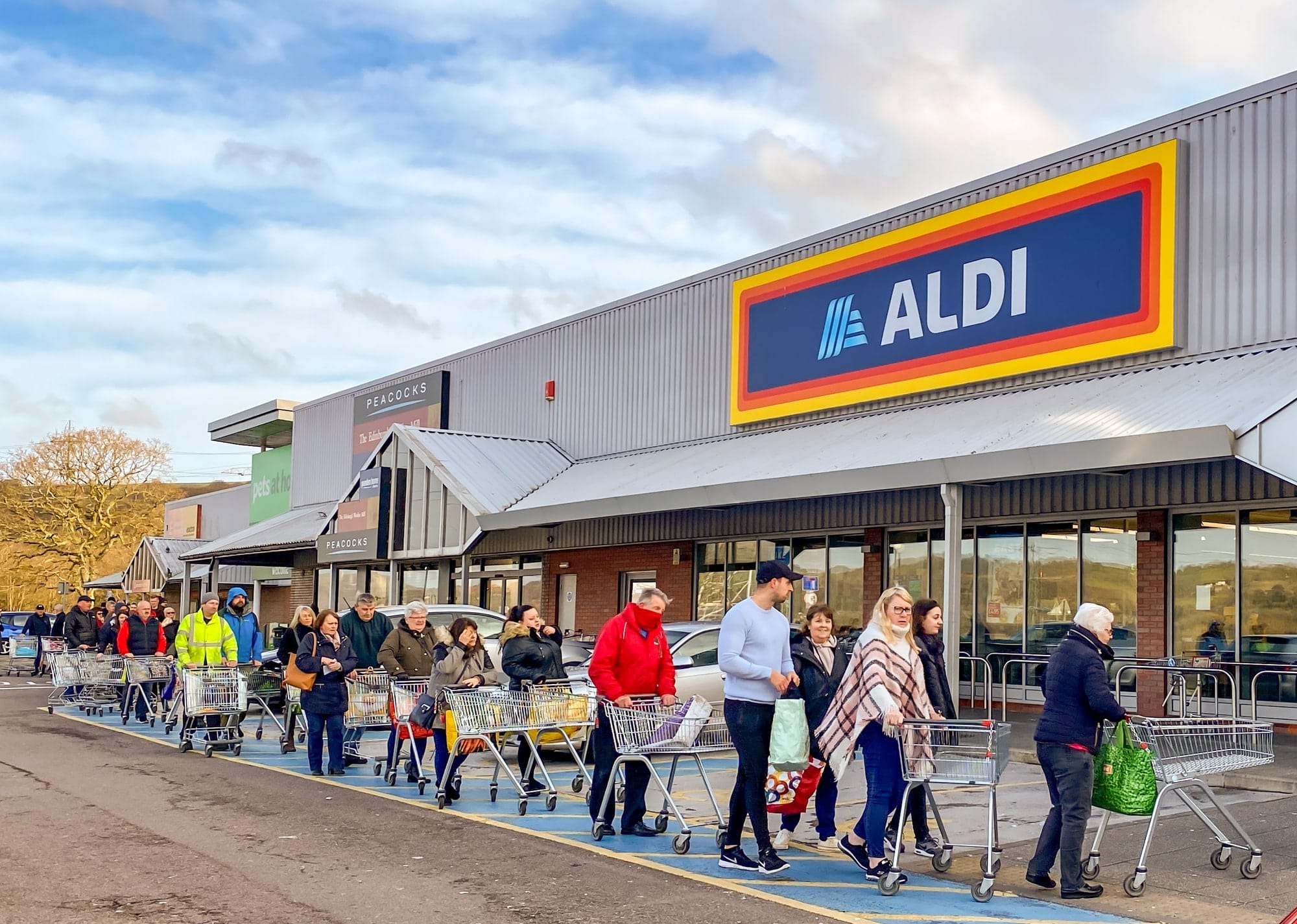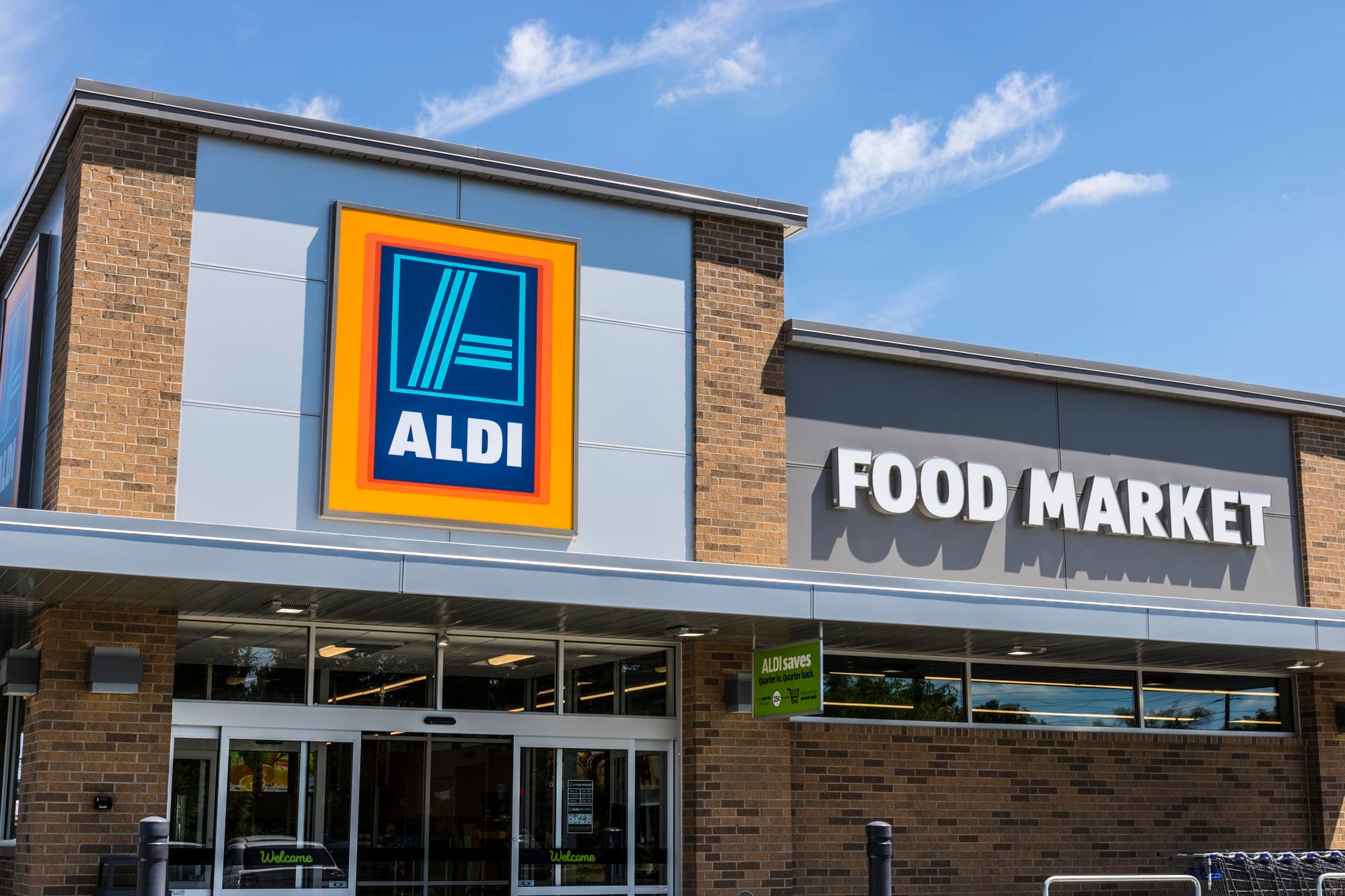If I ask you to list the top 5 retail stores, your list will contain the name, Aldi. Anyone who wants to buy groceries at discount rates heads to Aldi.
Due to such high demand for Aldi stores, the retail industry giant has opened more than 1,600 stores in 35 states of the US. Isn't that crazy? Despite being a German store, Aldi is considered among the top 3 grocery stores in the US.
After looking at the popularity of Aldi across the globe, today we have decided to conduct an Aldi PESTLE Analysis so that we can identify the external factors that impact the operations of Aldi.
However, before proceeding to the PESTLE analysis, let's discuss Aldi's history and current operations to develop an understanding of the grocery store chain.

Aldi is a popular discount grocery store chain that operates worldwide. It was founded in 1946 by two German brothers, Karl and Theo Albrecht.
Initially, the brothers opened a small grocery store in Essen, Germany. They focused on selling basic, essential products at low prices, which appealed to customers looking for affordable options during the post-World War II era.
The brothers soon expanded their operations and opened more stores in the surrounding areas. Then, in the 1960s, the brothers divided the company into two separate businesses: Aldi Nord and Aldi Sud.
Aldi Nord operates in northern Germany and other parts of Europe. In contrast, Aldi Sud operates in southern Germany and other parts of the world, including the United States, Australia, and the United Kingdom.
Over the years, Aldi has focused on providing high-quality products at low prices. The company achieves this through several strategies, including sourcing products directly from manufacturers, minimizing packaging, and keeping stores simple and efficient.
Aldi also offers a limited selection of products, which helps to reduce costs and simplify the shopping experience for customers.
Today, Aldi is one of the largest grocery store chains in the world, with over 10,000 stores in 20 countries. Aldi has developed a strong global customer base, and the grocery brand generates billions of revenue annually.
In 2021, Aldi's generated almost $134 billion worldwide. Due to its widespread operations, Aldi requires a large workforce. The company continues to expand and innovate, focusing on sustainability, digitalization, and customer experience.
Now that we have discussed Aldi's history and current position let's proceed with the PESTLE Analysis of Aldi. However, before proceeding further, we have to take a look at what PESTLE Analysis is.
PESTLE Analysis is a tool that businesses use to analyze what impact different Political, Economic, Social, Technological, Legal, and Environmental factors have on an organization. According to the findings of a PESTLE Analysis, businesses shape their policies and make decisions.
If you want to know more about this amazing business tool, look at some examples. Now that we have made our readers aware of the PEST Analysis, let's proceed further and identify how various external factors impact the operations of Aldi.
Political Factors
Aldi is a global discount supermarket chain that operates in multiple countries. Therefore, its operations are impacted by various political factors. For example, different governments' tax policies impact Aldi's operations significantly.
Like all businesses, Aldi must also pay taxes on its earnings, including corporate and sales taxes. As a result, any increase in tax rates increases Aldi's tax liability, reducing the company's profits.
On the other hand, tax reductions positively impact Aldi's bottom line, reducing its tax liability and increasing its profits.
In addition to changes in tax rates, tax incentives, and subsidies also impact Aldi's profitability. For example, governments may offer tax incentives to Aldi to encourage its sales.
Such incentives can reduce Aldi's costs and increase its profitability. Subsidies can also impact Aldi's profitability, as they can provide financial assistance to companies that produce certain products or operate in certain regions. Subsidies can reduce Aldi's costs and make its products more competitive.
Besides that, trade policies set by the government can impact Aldi's ability to sell imported products.
For example, suppose a government imposes a ban on the imports of products highly consumed by Aldi's customers. In that case, the grocery store will experience a decline in its sales. Hence, tariffs, trade agreements, and other trade barriers can influence Aldi's operations and profitability.
Moreover, political instability in a country can affect Aldi's operations and ability to conduct business. Unstable governments, political violence, and civil unrest can cause operational disruptions and impact Aldi's supply chain.

Economic Factors
Every business is impacted by various economic factors significantly. For example, since Aldi is a grocery store, it is highly impacted by consumers' income levels.
Aldi's business model is based on offering high-quality products at low prices. This approach appeals to budget-conscious consumers looking to save money on their grocery bills. As such, Aldi may be impacted by changes in consumer income.
During a recession or other economic downturn, consumers have less disposable income to spend on groceries. This can lead them to seek discount retailers like Aldi, offering them lower prices on the items they need.
In this sense, Aldi may actually benefit from an economic downturn, as more consumers turn to the store to save money. On the other hand, during economic growth, consumers may have more money to spend on groceries.
Customers may be more likely to shop at higher-end retailers that offer a wider selection of products and a more upscale shopping experience. This could impact Aldi's sales and profits, as some consumers may shop elsewhere.
Besides the consumer's level of income, inflation has a significant impact on the operations of Aldi. Inflation impacts Aldi in a few ways. Firstly, if the cost of goods and services increases, Aldi may need to pass on some of these costs to consumers through higher prices.
This could impact the company's ability to maintain its competitive advantage as a low-cost retailer.
Moreover, inflation can cause a decrease in the purchasing power of consumers. This will cause the sales of Aldi to drop. Hence, Aldi's profits will be impacted negatively due to inflation.

Social Factors
Like any other business, Aldi is impacted by various social factors. Since Aldi's target market is typically budget-conscious shoppers looking to save money on their groceries, the demographics of a given area can significantly impact Aldi's performance.
Suppose Aldi is located in an area with a large population of younger consumers. In that case, it may be more successful because younger consumers tend to be more price-sensitive and are more likely to shop at discount retailers.
Conversely, suppose Aldi is located in an area with an older population. In that case, it may be less successful because older consumers tend to have more disposable income and may be more willing to pay for higher-end products.
Moreover, education level can also impact Aldi's performance. Consumers with higher levels of education may be more likely to prioritize factors like convenience, quality, and brand recognition over price when making purchasing decisions.
As such, if Aldi is located in an area with a high proportion of highly educated consumers, it may be less successful.
Other than that, changes in consumer shopping habits can also impact Aldi. For example, the rise of e-commerce and online grocery shopping has created new challenges and opportunities for retailers like Aldi.
People now prefer shopping online, especially after COVID-19. This change in consumer habits can cause Aldi's sales to fall if it doesn't promote its online store.
Technological Factors
As the world is experiencing technological changes, Aldi is also one of the brands impacted by these changes. So let's analyze how various technological factors impact Aldi.
The rise of e-commerce and online shopping significantly impacts the retail industry. With the increasing popularity of online shopping, traditional brick-and-mortar retailers like Aldi had to adapt to this new trend to remain competitive.
As a result, Aldi has recently started offering online ordering and home delivery services. While e-commerce presents a significant opportunity for Aldi to reach more customers and increase sales, it poses some challenges.
For example, the company must invest in technology to support its e-commerce operations, such as online ordering platforms, payment processing systems, and delivery logistics.
Additionally, Aldi will need to ensure that its website and mobile app are user-friendly and offer its customers a seamless online shopping experience. As a result of adapting to e-commerce, the costs of Aldi will increase.
Moreover, Aldi has invested in automation technology to streamline operations and reduce costs. For instance, the company uses automated conveyor systems to move products from the storage area to the sales floor.
Continued investment in automation technology could help Aldi remain competitive and improve its operational efficiency. Besides that, Aldi could use data analytics to monitor its sales and analyze its consumers' choices to make future decisions.

Legal Factors
Aldi is a multinational brand. It operates in more than 20 countries. To operate in different geographical locations, Aldi must abide by the laws set by different governments. As a result, different legal factors impact Aldi.
As a company that employs thousands of workers, Aldi is subject to a variety of employment laws and regulations that govern how it treats its employees. These laws protect workers from unfair treatment, discrimination, and unsafe working conditions.
One of the most influential employment laws that Aldi must comply with is the minimum wage law. These laws require employers to pay their workers a minimum wage for hours worked.
The minimum wage varies depending on the country and state of Aldi. However, it is generally designed to ensure workers are paid a fair wage. Another essential employment law that Aldi must comply with is anti-discrimination laws.
These laws prohibit discrimination based on race, gender, religion, and sexual orientation. Therefore, Aldi must ensure that its hiring, promotion, and termination decisions are based solely on job-related factors and not protected characteristics.
Moreover, Aldi relies on a network of suppliers, landlords, and other business partners to operate efficiently and effectively. To establish and maintain relationships with these partners, Aldi must enter into contracts that define the terms of the business relationship.
While drafting these contracts, Aldi must ensure that the terms of the contracts are fair and reasonable. Suppose the terms of the contract are found to be unfair or unreasonable. In that case, the contract may be unenforceable, or Aldi may face legal and financial consequences.
Environmental Factors
Different environmental factors impact the operations of Aldi. Since Aldi is a grocery brand, it has to deal with packaged products. As a result, the grocery chain is responsible for producing significant waste through its operations, including packaging and food waste.
Regulations on waste disposal and consumer attitudes toward sustainability can impact Aldi's operations. Since the government and pressure groups have become active in ensuring that businesses adopt clean practices, Aldi has to be careful while disposing of its waste, or else it can face heavy penalties.
Moreover, governments are now paying attention to climate change, so they are now monitoring the efforts of businesses to reduce their carbon footprints. For example, Aldi's stores consume significant energy, contributing to the company's environmental footprint.
Aldi can respond to these challenges by adopting energy-efficient technologies, investing in renewable energy sources, and working to reduce energy consumption in its stores.

Aldi PESTLE Analysis: Final Word
Aldi is one of the most renowned grocery store chains. It has thousands of branches spread across the globe. People prefer to shop from Aldi due to the discounted prices it offers.
Aldi no doubt impacts our lives significantly. However, this article highlighted the external factors that impact the operations of Aldi. At the start of this article, we discussed the history and operations of Aldi.
After that, we conducted the PESTLE analysis of Aldi to see what Political, Economic, Social, Technological, Legal, and Environmental factors impact the grocery store chain. Reading this article would have made you aware of the framework of PESTLE analysis and the external factors impacting Aldi.
Besides the external factors, if you want to analyze the internal factors affecting Aldi's operations, read our Aldi SWOT Analysis.










